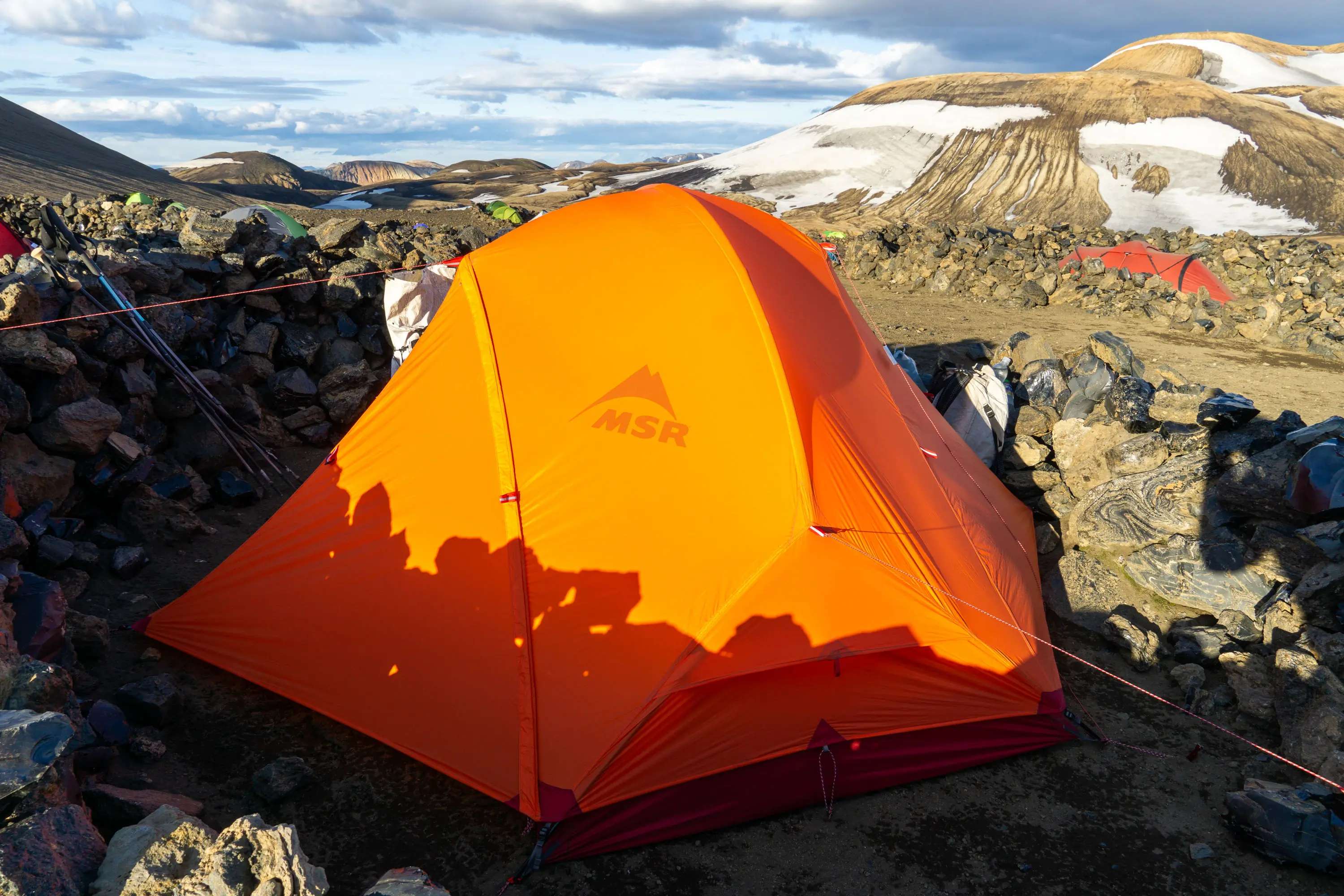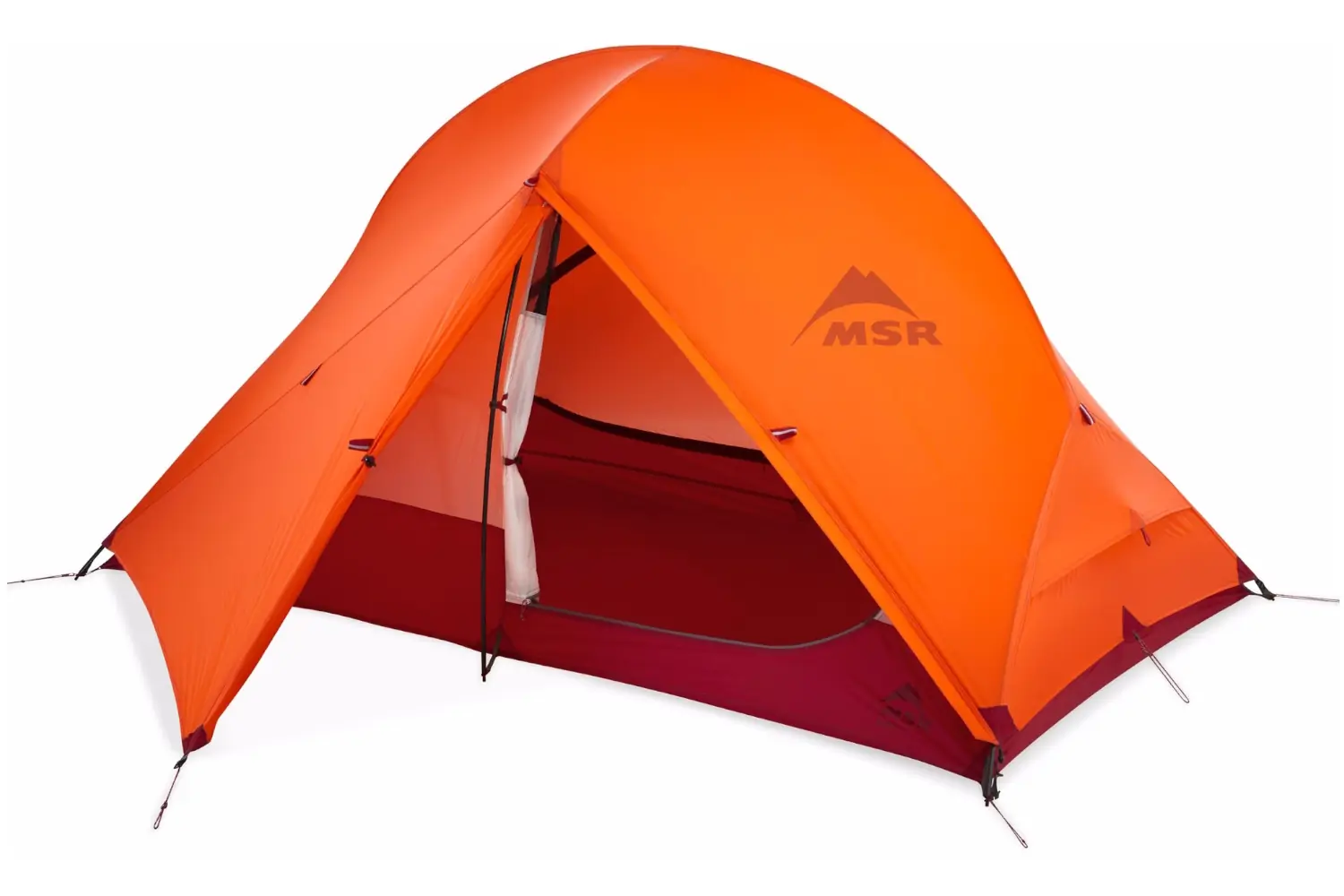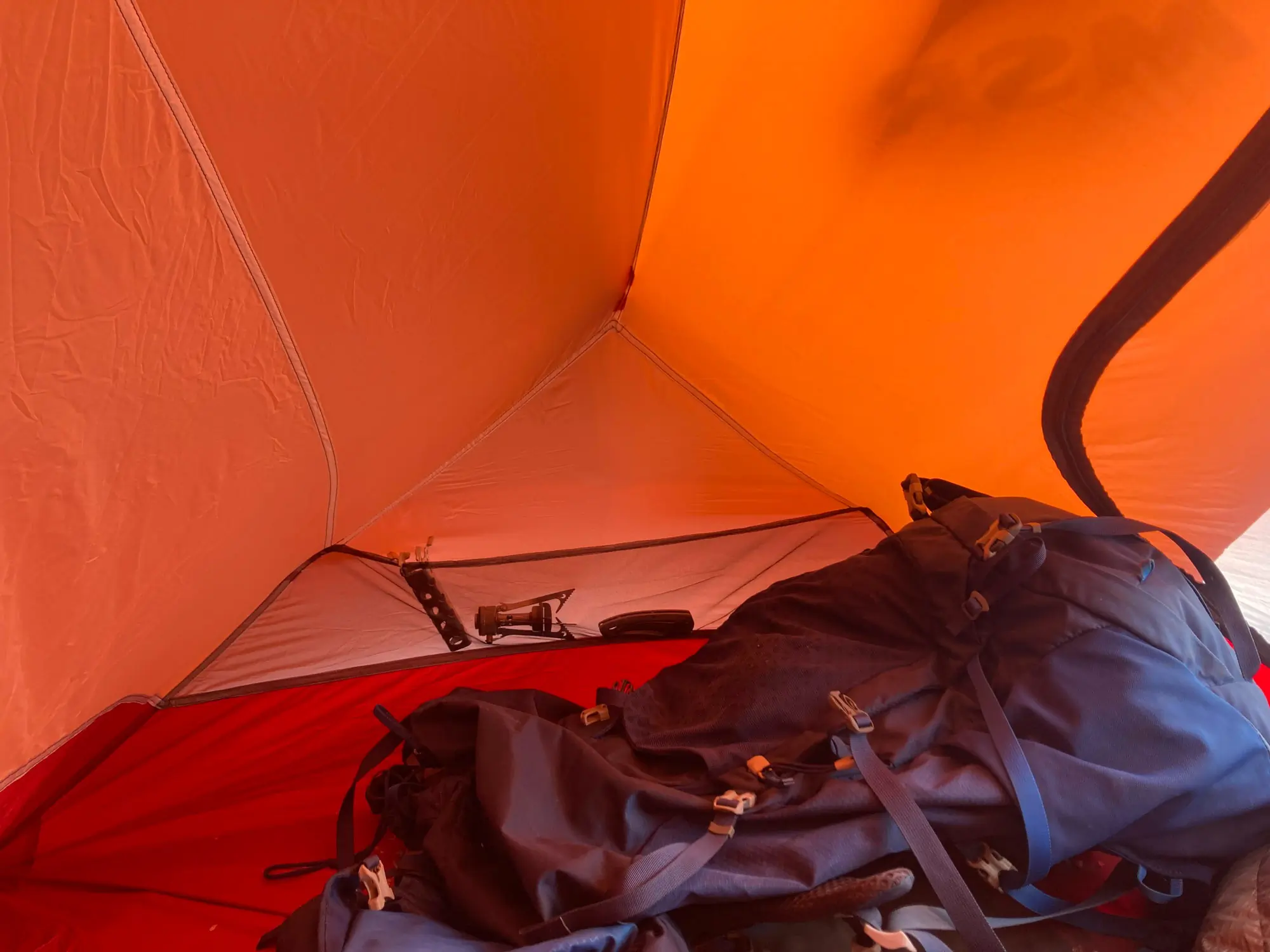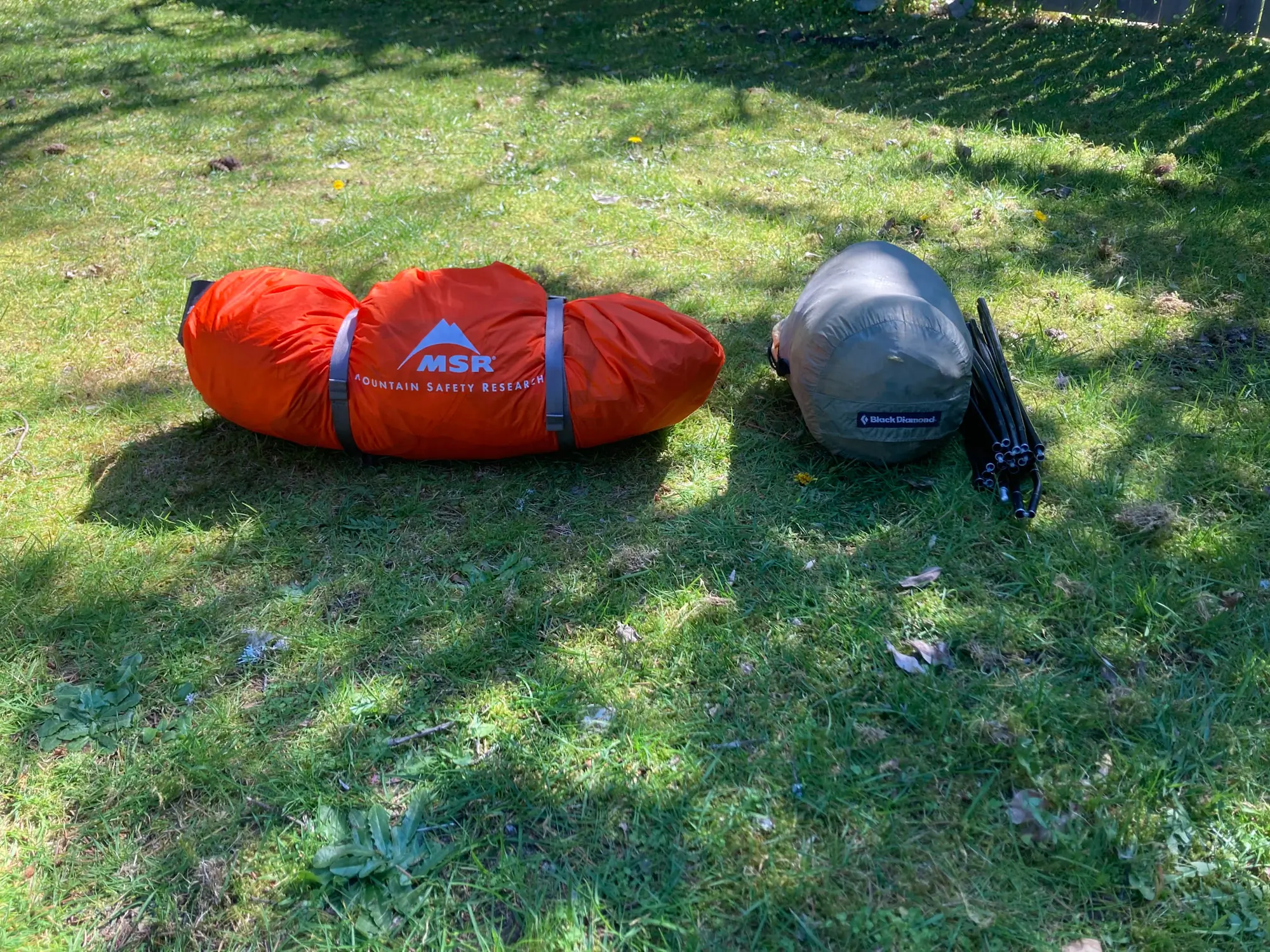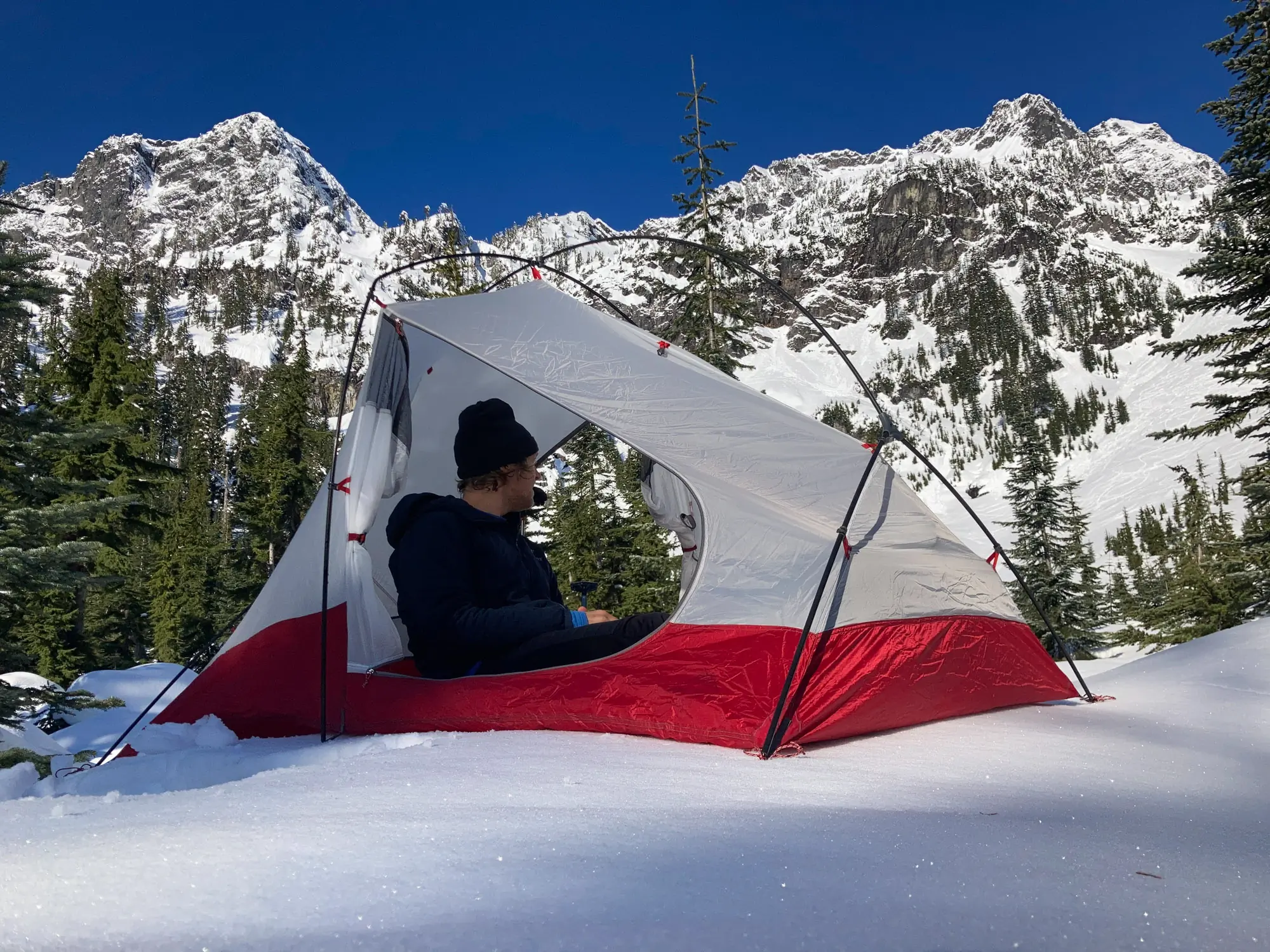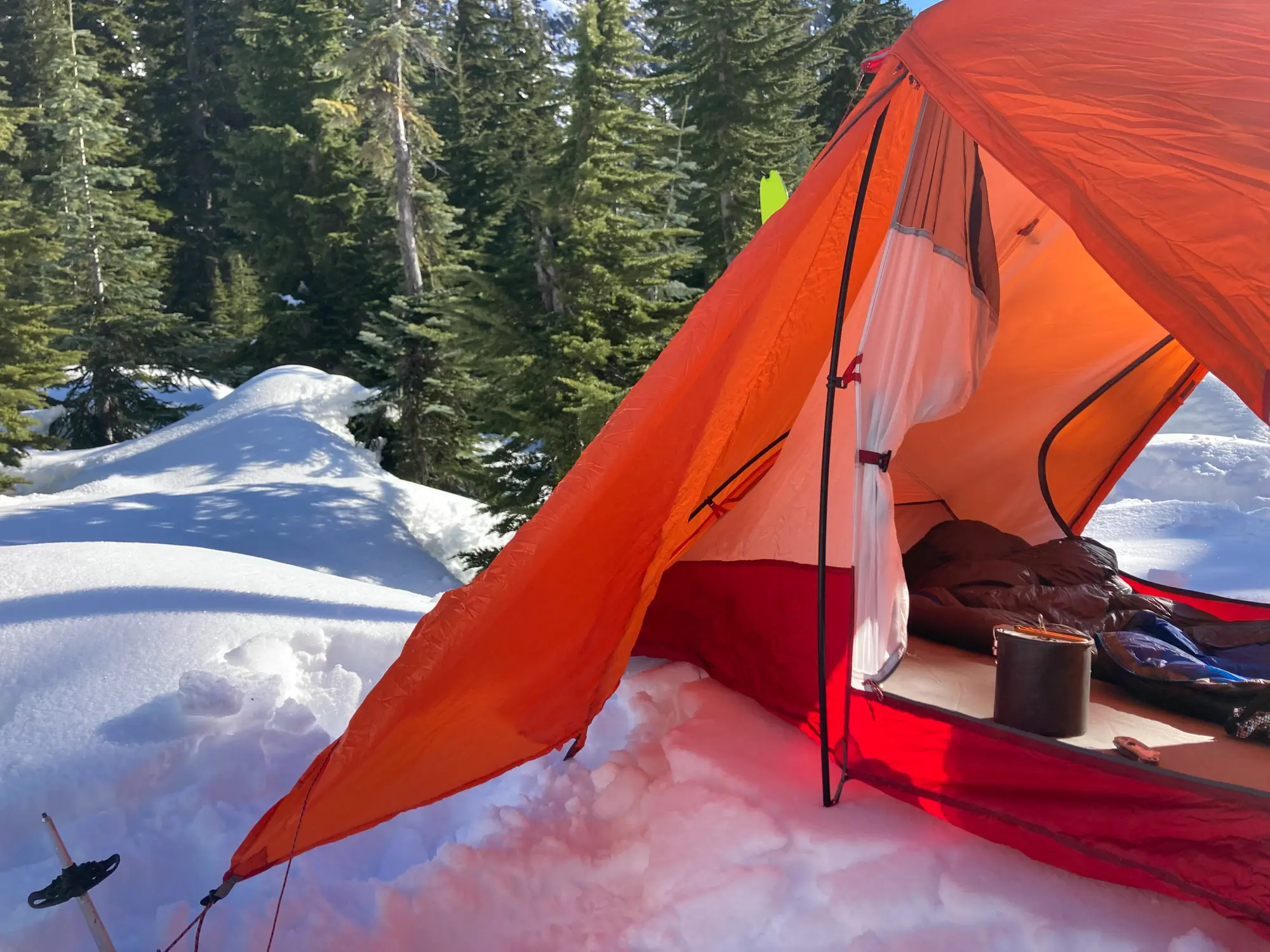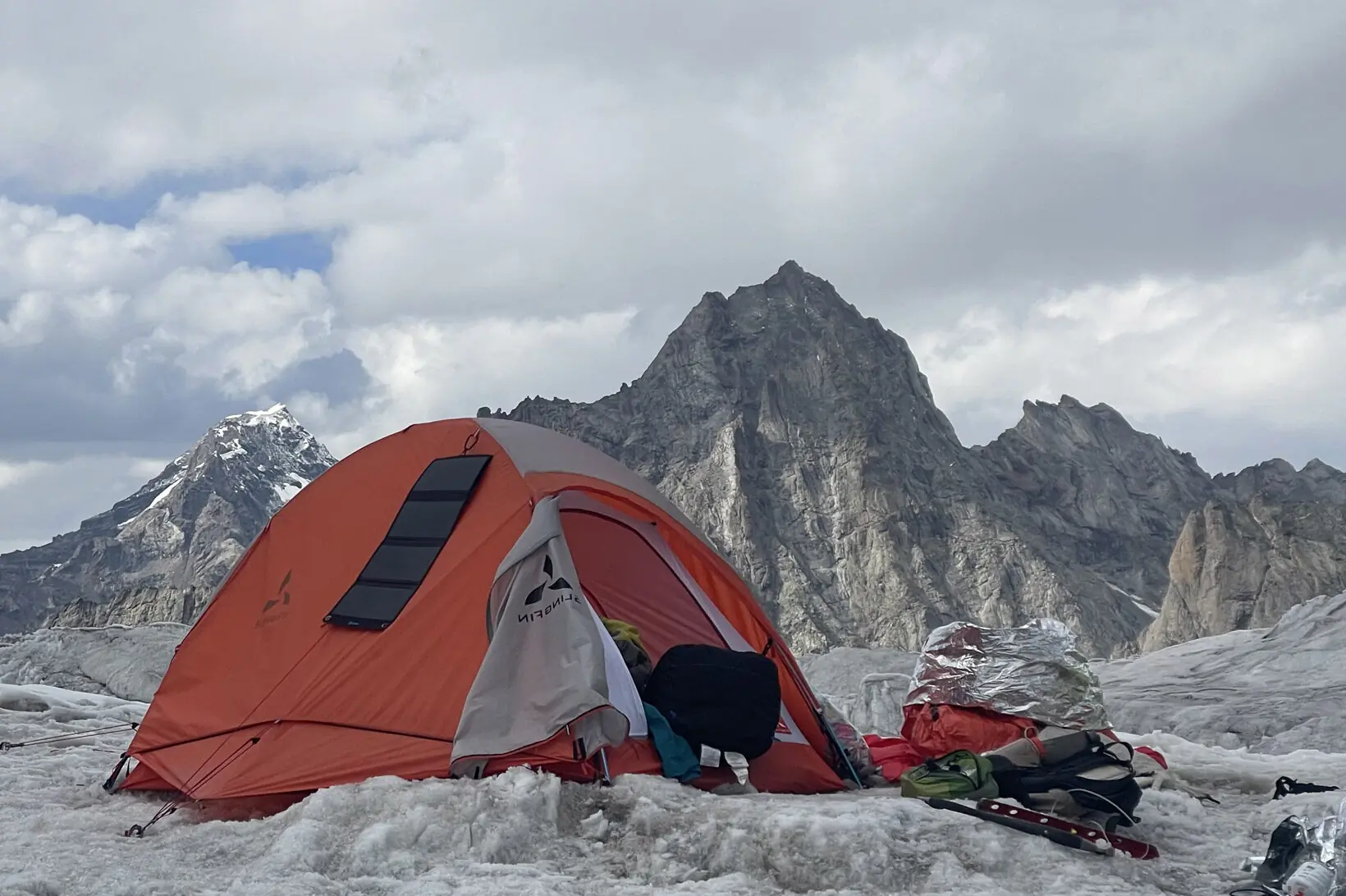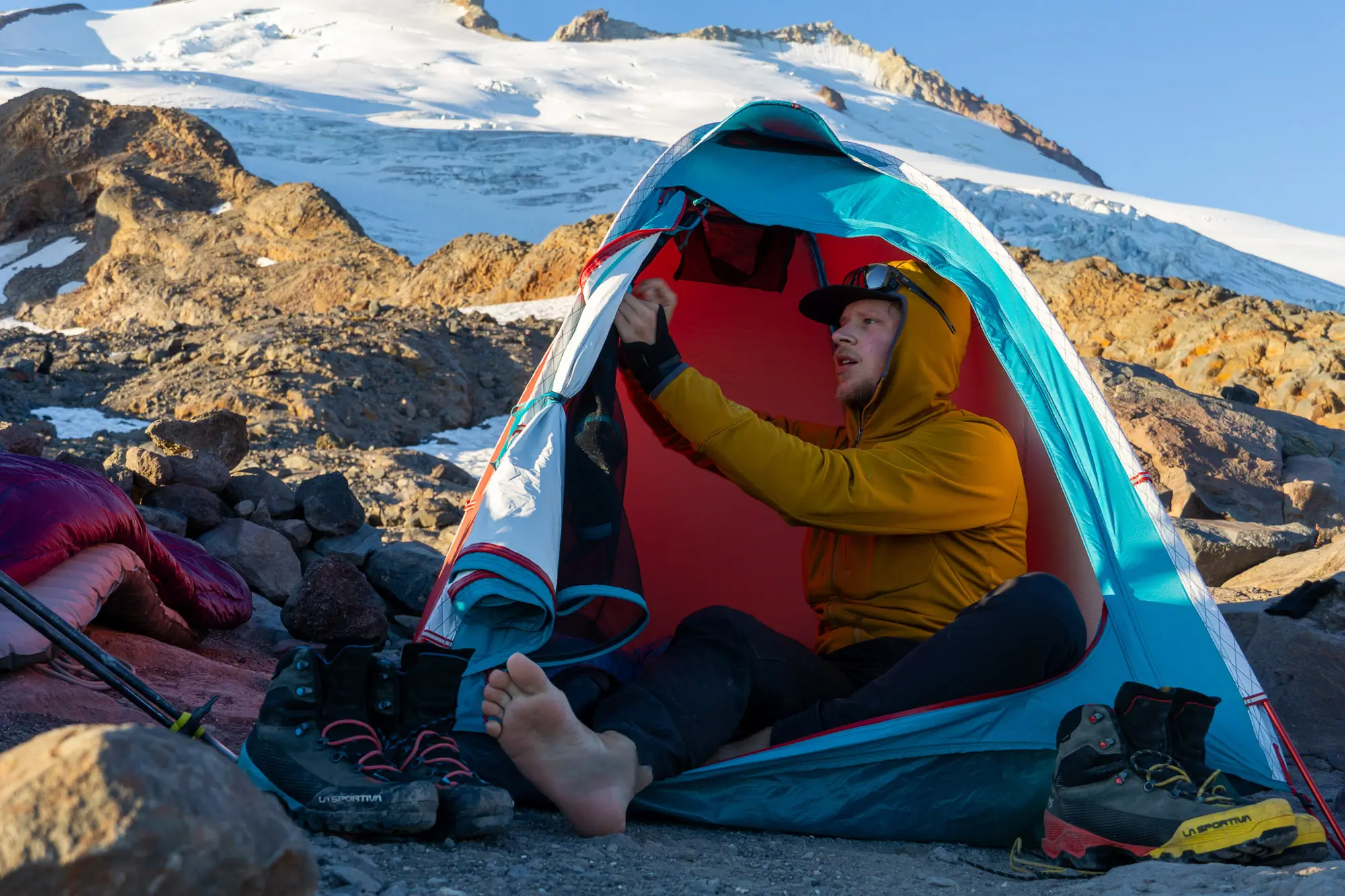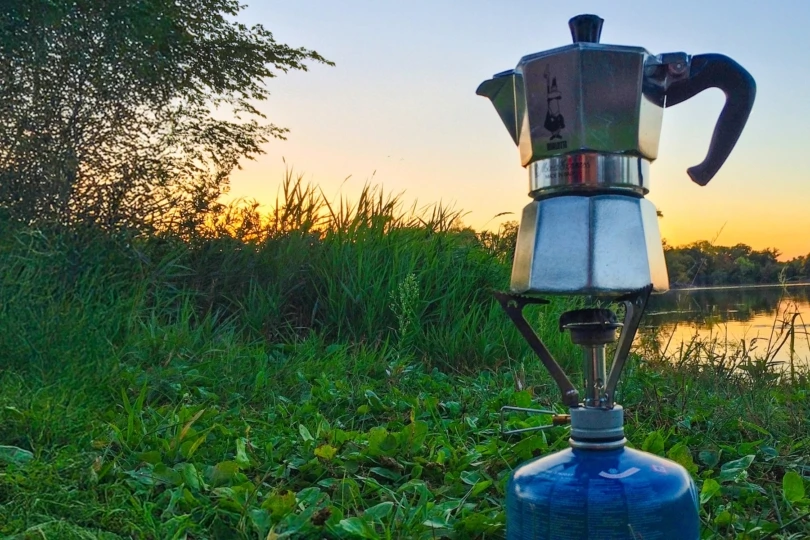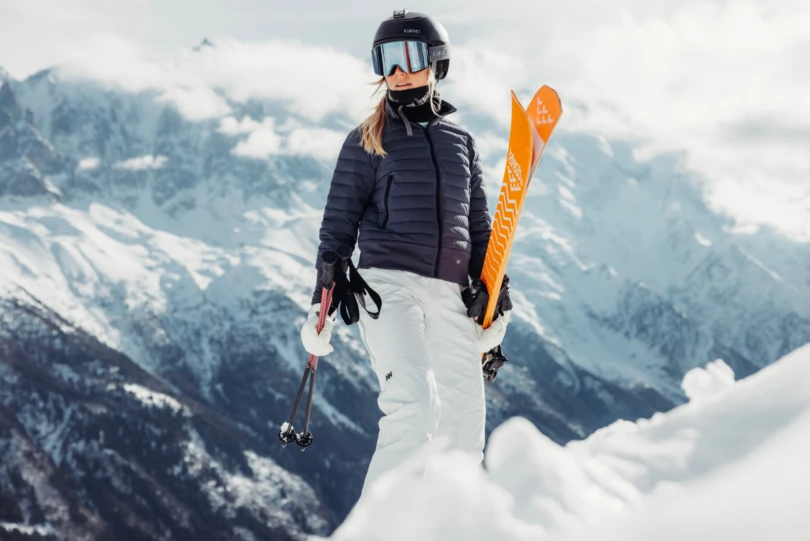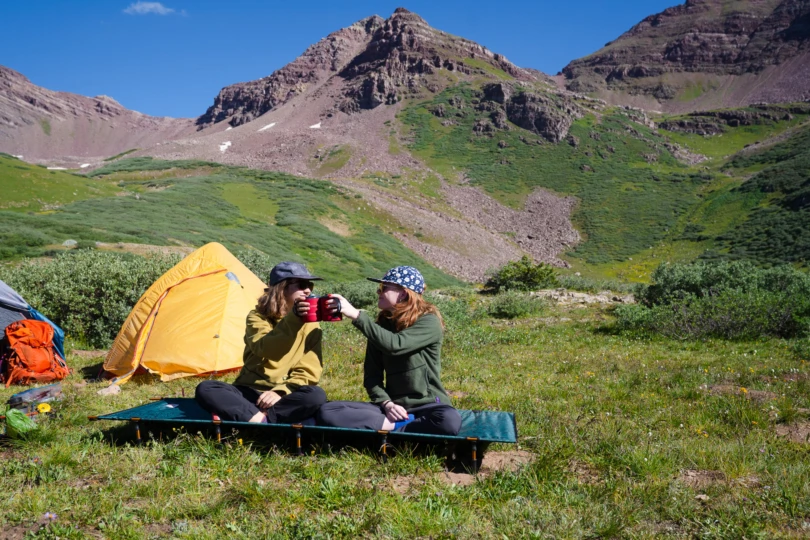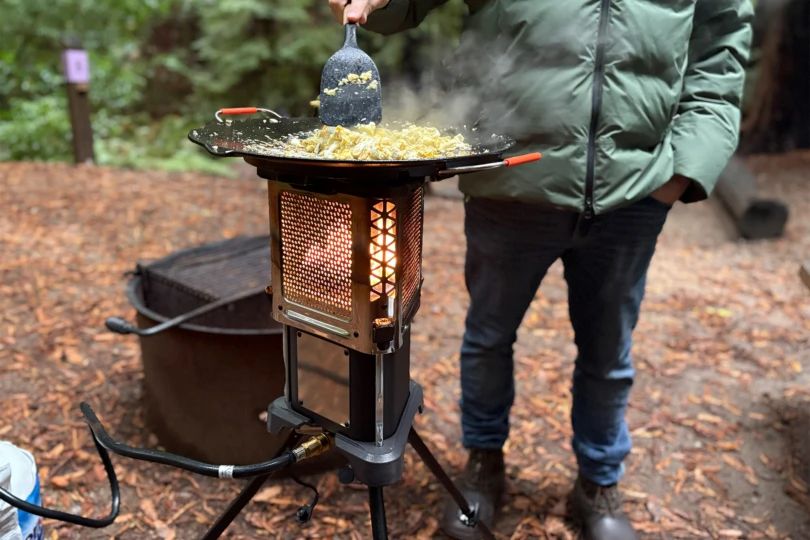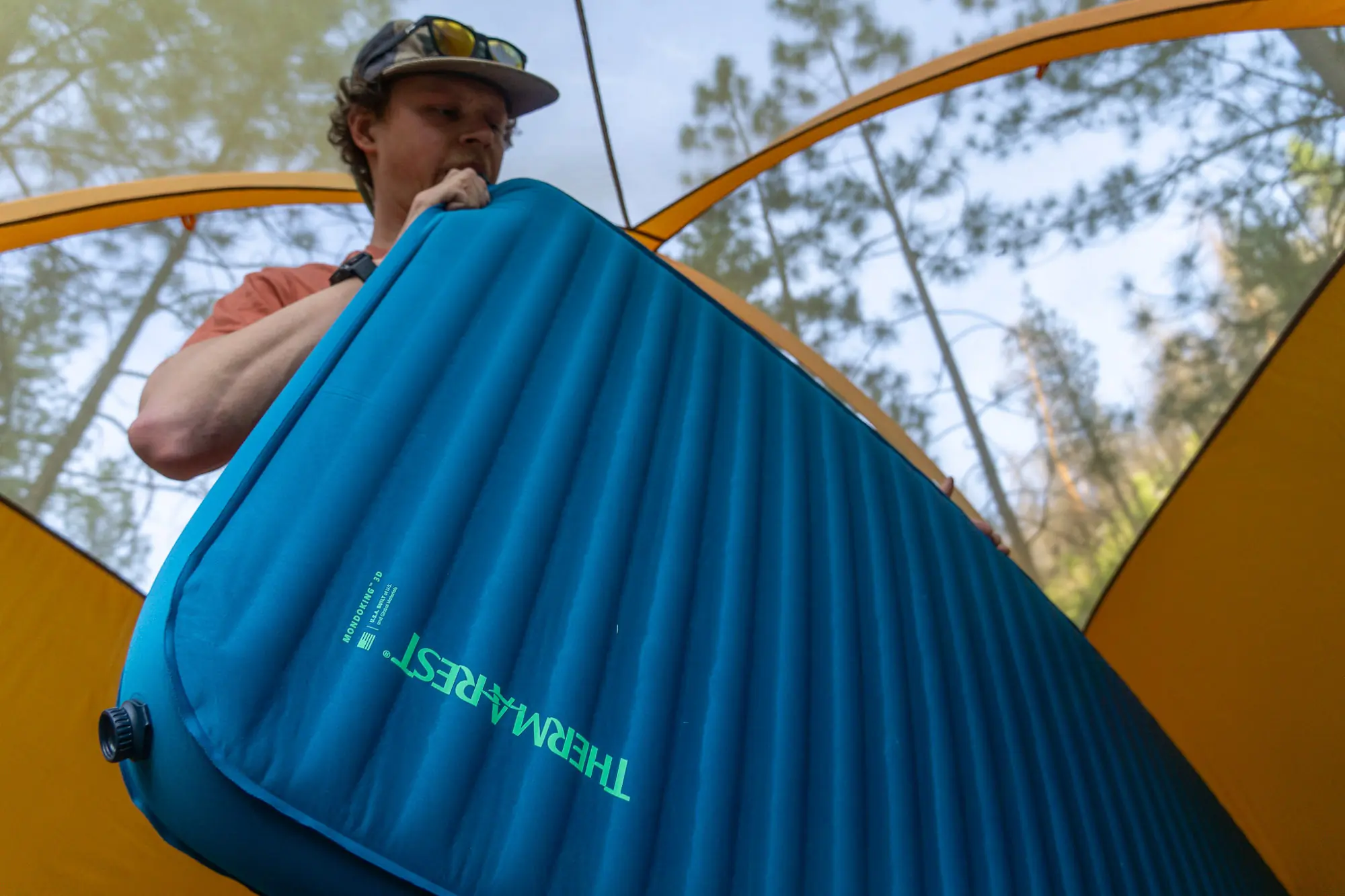With 40mph winds blasting my face, I jumped into the flapping tent, desperate to get shelter from the snow pellets hitting my forehead. As I struggled to attach the poles to the inside of the tent, I thought: there must be a better way.
For most of my winter and spring ski trips, I’ve used a single-wall tent such as the Black Diamond First Light: simple, durable, and … cramped. Though this type of shelter is bomber and built for extreme weather conditions, it isn’t necessary much of the time, especially on spring ski traverses or early-season backpacking trips when temperatures are rising and the weather is shifting.
This spring, instead of struggling to set up poles from the inside out, I reached for the MSR Access 2 Tent for a ski trip in the backcountry at Snoqualmie Pass, just an hour east of my home outside of Seattle. Straddling the line between 3-seasons and 4-seasons, this tent is a perfect shoulder season tent that can handle tough conditions yet remains light and comfortable while feeling more like a summer backpacking tent.
I tested this tent at the base of Bryant Peak in the heart of the Cascade Mountains in Washington. The weather was mild, surprisingly warm for this time of year, and one of the biggest challenges I faced was staying dry from all the wet, slushy snow. I immediately loved how easy the tent was to set up, how light it was, and how versatile it felt.
In short: I tested the MSR Access 2 where it belongs: at tree line, in the snow (or not), during shoulder season when the weather and conditions are variable and unpredictable — and it excelled. I would use this tent on a multiday ski traverse, a lightweight backpacking trip, or a mountaineering adventure in any season. It doesn’t meet the highest standards of a 4-season tent, but it is suitable for almost anything but the harshest of circumstances.
Check out GearJunkie’s Best 4-Season Tents Buyer’s Guide to see why the MSR Access 2 won our Best Shoulder Season Crossover Tent title and compare it to others on the market.
-
Weather Resistance
7.0
-
Living Space
6.0
-
Durability
6.0
-
Size & Weight
8.0
- Type: Treeline ski-mountaineering
- Weight: 4 lbs., 1 oz.
- Doors: 2
- Sleeps: 2
- Floor Area: 29 sq. ft.
- Vestibule Area: 17.5 sq. ft.
- Height: 42"
- Walls: Double
Pros
- Minimal pack size that rivals some backpacking tents
- Double wall and two door design bumps up livability
- Impressively sturdy for the weight
- Mostly solid interior fly holds in heat
- Studded with guy-out points
Cons
- Carbon fiber poles aren't the most durable, and need to be treated with care
- No interior room for gear, has to be stored out in vestibules
MSR Access 2 Tent: Review
Design and Purpose
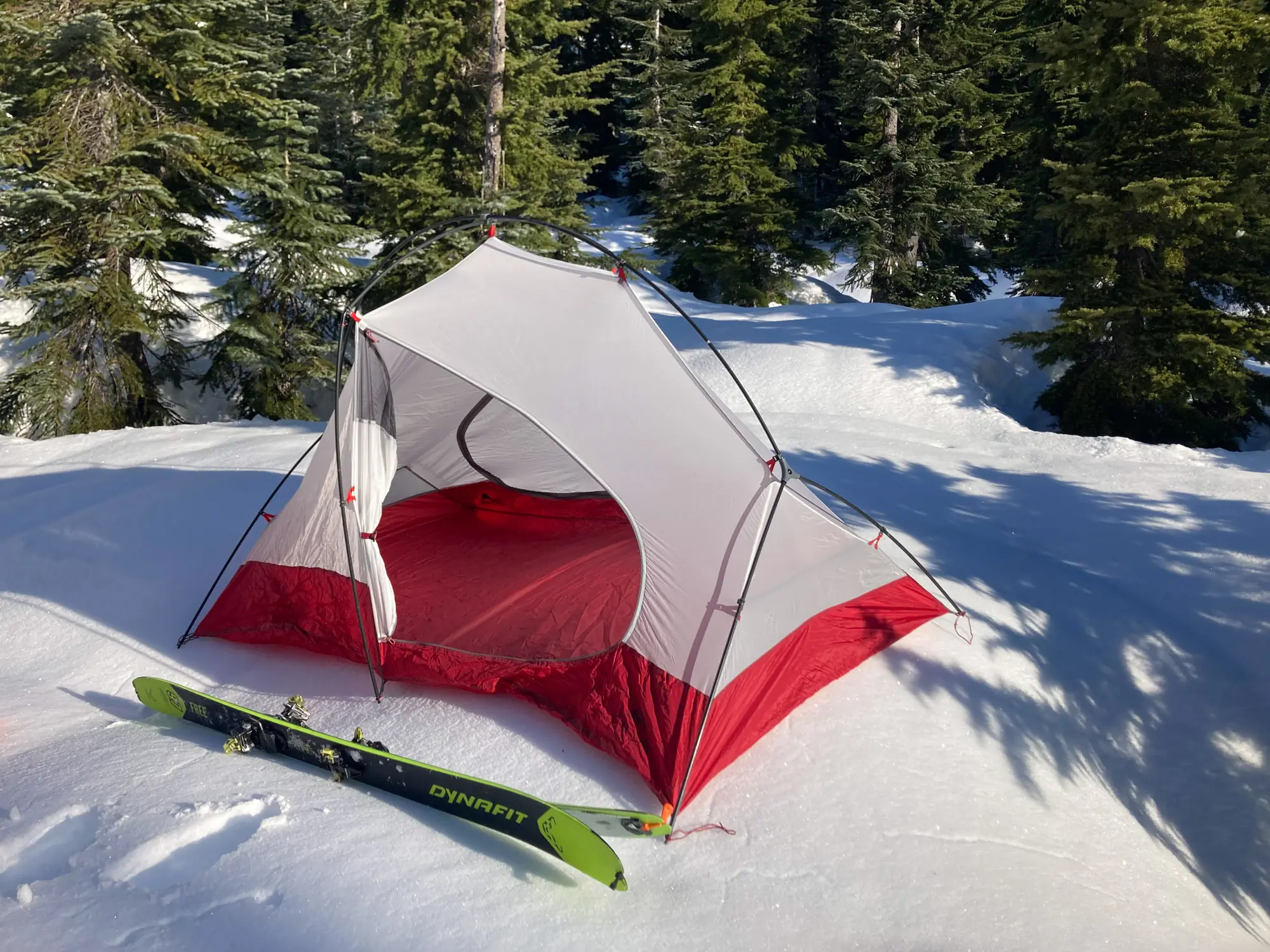
The MSR Access 2 isn’t the most storm-worthy tent the brand makes (look to the Advance Pro 2 or Remote series for that), but instead, it bridges the gap between the backpackable Hubbas and the tents you might otherwise batten down the hatches with during a true winter storm. Designed as a ski-touring shelter, the Access thrives at treeline where multi-night ski traverses most often make camp, and the tent trades some muscle for weight savings.
The peak of the Access is arched much more aggressively compared to the Hubba Hubba line, which aids in shedding snow loads. The addition of a secondary pole that runs perpendicular to the ridge pole and all the way to the ground undoubtedly bolsters that structure. Most of the mesh of the interior tent body has also been removed, making for a warmer tent in frosty conditions.
And even for all the bulking up the Access has, it still only tips the scales at 4 pounds — no featherweight shelter to thru-hike with, but entirely within reason for early-season backpacking where you might hit a lingering spring squall. Jack of all trades usually makes them a master of none, but as the link between the third and fourth seasons, the Access brings some serious value.
First Impressions on a Ski-In Overnight
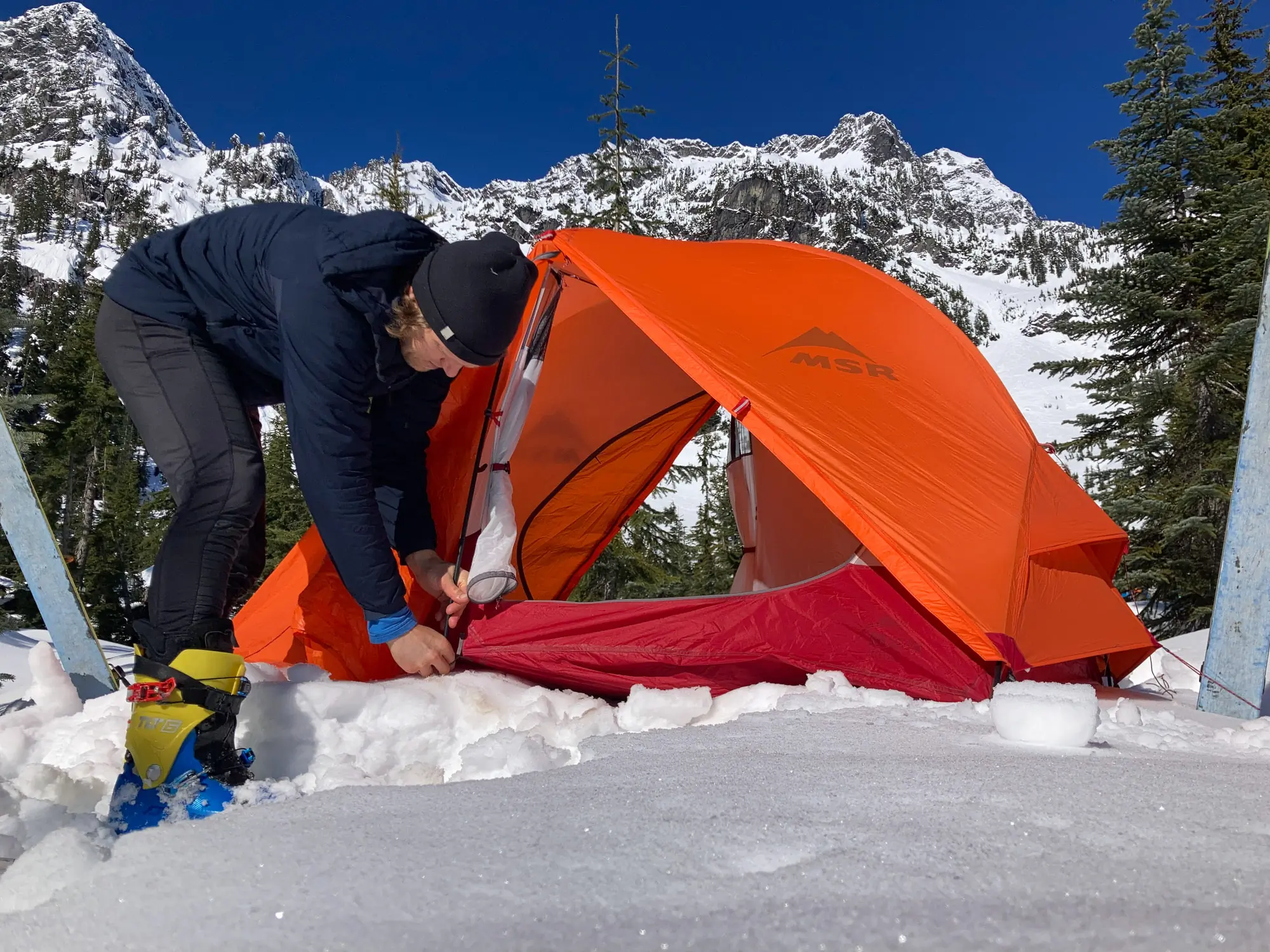



At first look, in its packed-up state, the MSR Access 2 seems rather large, but when I first held the tent, it sure felt light. At 4 pounds, 1 ounce, with carbon fiber poles and a rainfly, this tent compares to the weight and functionality of other high-end 3-season tents, but with more specific features that make it suitable for all four seasons.
I’ve owned the MSR Hubba Hubba tent in the past, and while it is similar to the Access in the way it sets up, looks, and feels, those shelters are definitely more of a backpacking summer tent. The Hubba Hubba is much more breathable, and the rainfly isn’t specifically thought out for winter camping.
On the other hand, the Access 2 uses a fly that is positioned low, providing protection from blowing spindrift. It’s set with many sturdy guylines, and the steep slanted walls and ceiling help give the tent a sturdy structure and prevent snow buildup.
Many 3-season tents focus on breathability, weight savings, and rain protection; the Access 2 checks all of these boxes. I like the fact that it has some breathable mesh woven into the two side doors, which easily roll up and clip out of the way, allowing a full breeze to come through.
Yet, most of the tent body is ripstop nylon with a DWR finish, which helps keep the interior dry. I love that this is a double-wall tent, meaning condensation is less likely to creep inside, like what happens to many single-wall 4-season tents.
Flush With Functionality, With Some Concessions
With floor dimensions at 84” x 50”, there was plenty of room for my 6’2” frame to fit comfortably, and though I was on a solo trip, I felt that having a tent mate would be no problem in terms of space.
The vestibules are a bit small, but I could easily store my boots and pack them outside the tent body without them sticking out from the fly. I felt that the interior pockets were lacking, something that many 3-season tents do better, though I did appreciate the small loops hanging from the tent ceiling where I could hang and dry gear.
I felt like I could move around the tent efficiently and easily, zipping and unzipping the doors and fly without having to move much, and I love the simplicity of the tent. The MSR Access gets the job done without too much extra fluff.
Pitching in the Snow
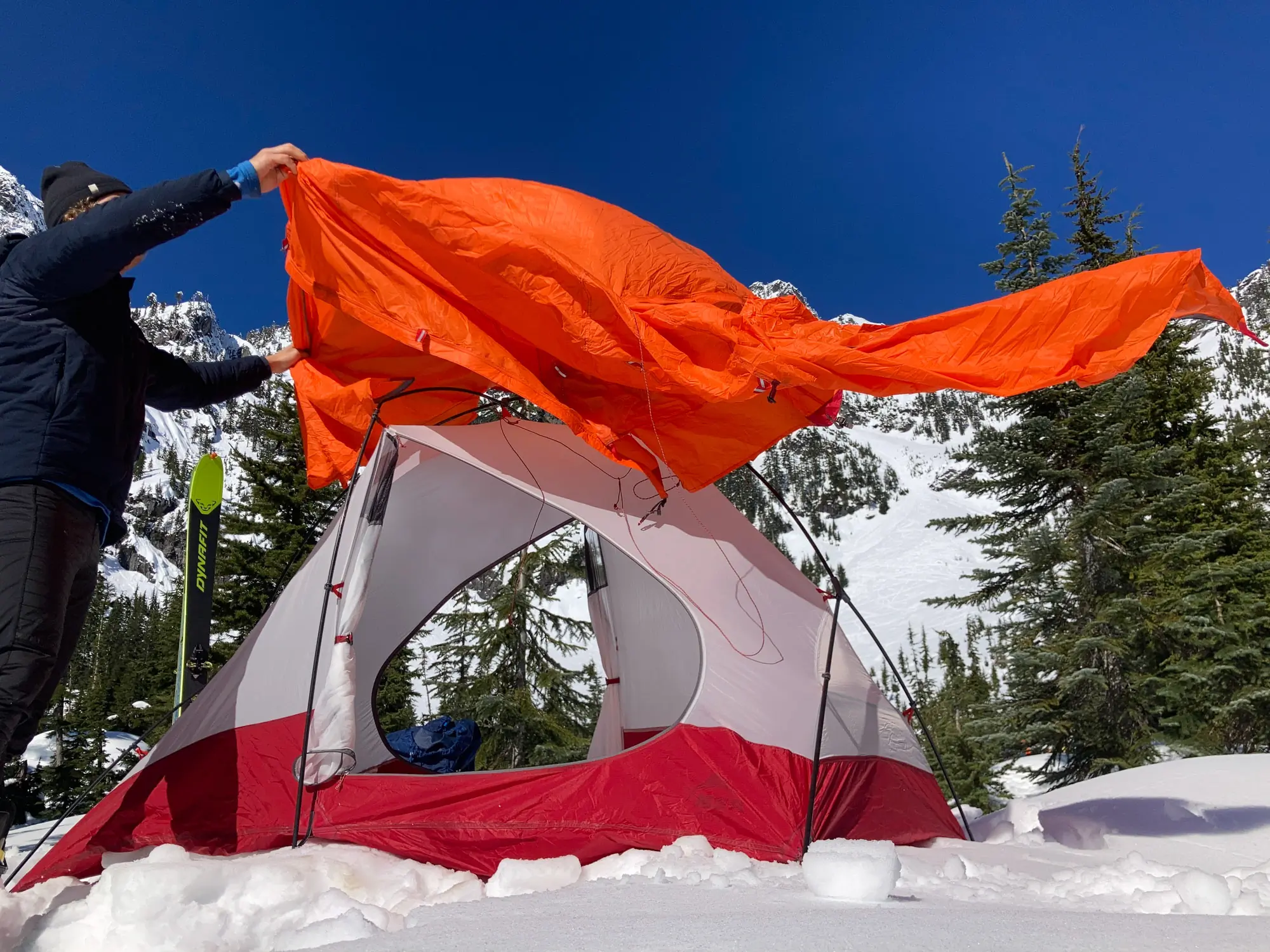



On a day when every step meant post-holing into deep snow, I especially appreciated being able to move the tent around and set up the tent body without moving my feet. That’s how simple and light the tent is.
One of the cruxes of camping in the snow is solidly staking the tent, and I loved how the tent fly had wide loops of cordage attached, making it easy to fit my skis and ski poles into the loops to hold the tent down effectively.
However, I was a bit disappointed with the stakes that came with the tent, which are effectively useless in soft snow, though not many stakes would have worked in the type of soft snow I encountered. Safe to say: best to ad-lib your own snow stakes on this one.
The tent fly fits close to the body, allowing it to withstand strong winds and storms. But to be a true 4-season tent, the fly would need to connect to the poles beyond just the bottom attachment points.
The tent is as light as it is because the poles themselves are made of carbon fiber. Carbon fiber has a very high strength-to-weight ratio, but it tends to break, not bend, more easily than aluminum. Keep that in mind when out in the backcountry, as care must be taken when handling these poles, though a little precaution goes a long way.
Room for Improvement
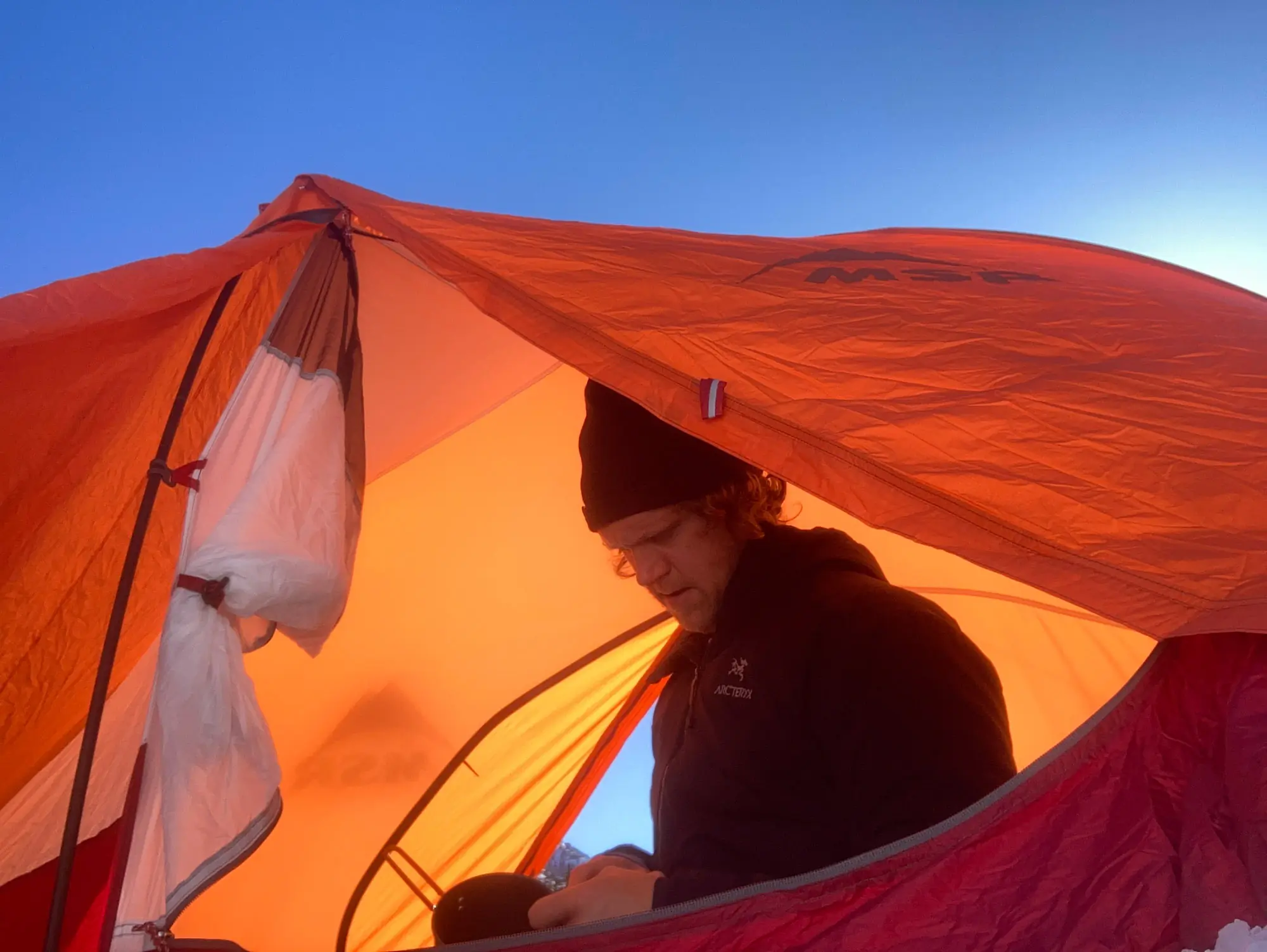



As with any piece of gear that tries to fit into a one size fits all category, there are going to be imperfections. This tent isn’t the largest, most durable, or best 4-season shelter, nor is it the most breathable, most ultralight, or roomiest 3-season tent.
When you compare this tent to something like the Mountain Hardwear Trango 2 tent, which is a 9-pound shelter and has tent poles that cross and reinforce the tent well beyond the norm, it’s clear that there are more burly 4-season tents. On the other side of the spectrum, the Zpacks Plex Solo tent is a true UL tent, weighing just 13.9 ounces and made of Dyneema. Smack dab in the middle — the Access has to give up some performance on both ends.
I’d like to see more pockets in the interior, larger vestibules, and better stakes. It could stand to pack down a little smaller, and, dare I say, cost a little less for not being a true 4-season tent.
However, for someone who is looking for a tent that will perform in almost any season, I’d still put my money on the Access 2.
MSR Access 2: Conclusion
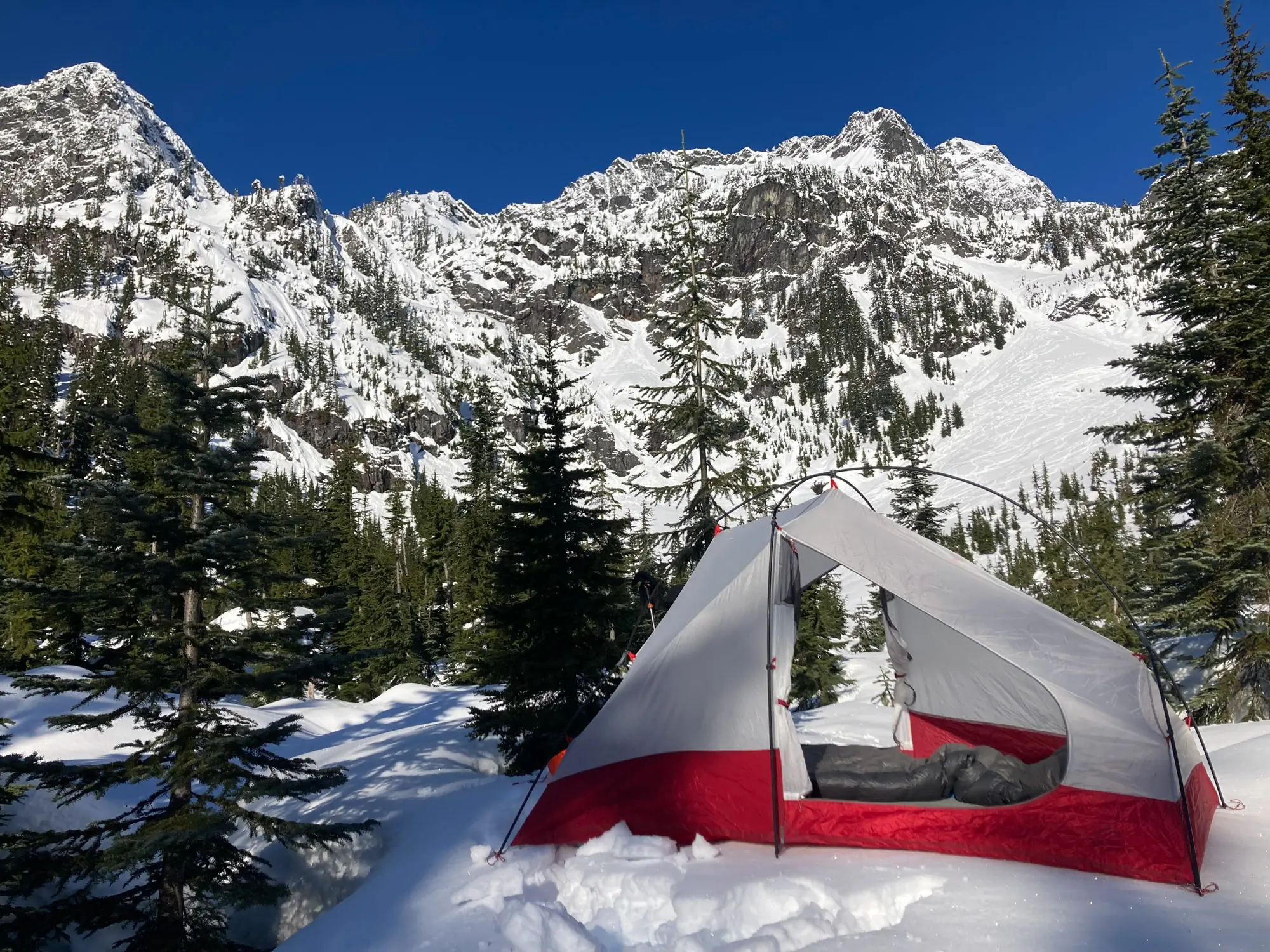



I would use the MSR Access 2 any time of the year, in almost any condition, and in all but the worst of weather. The combination of simplicity, lighter weight, a well-thought-out tent geometry, and an effective rainfly make it highly functional and efficient.
For this tent to be a true 3-season tent, it could stand to be a little more breathable and lighter, and for it to be a true 4-season tent, it would need slightly larger vestibules, and a more bomber exterior. When straddling the line between winter and spring, or fall and winter, this tent stands out as crossing over into both realms.
As I was breaking down my camp at my quiet spot near a stream flowing from Source Lake, I was already planning where I could take this tent next. Mount Baker for an early-season ascent of the North Ridge? Canoeing in the North Cascades with my young kids? A ski traverse in the Enchantments in central Washington? When you find a piece of kit that is perfect in almost any season, the possibilities for where you can take it feel endless.
